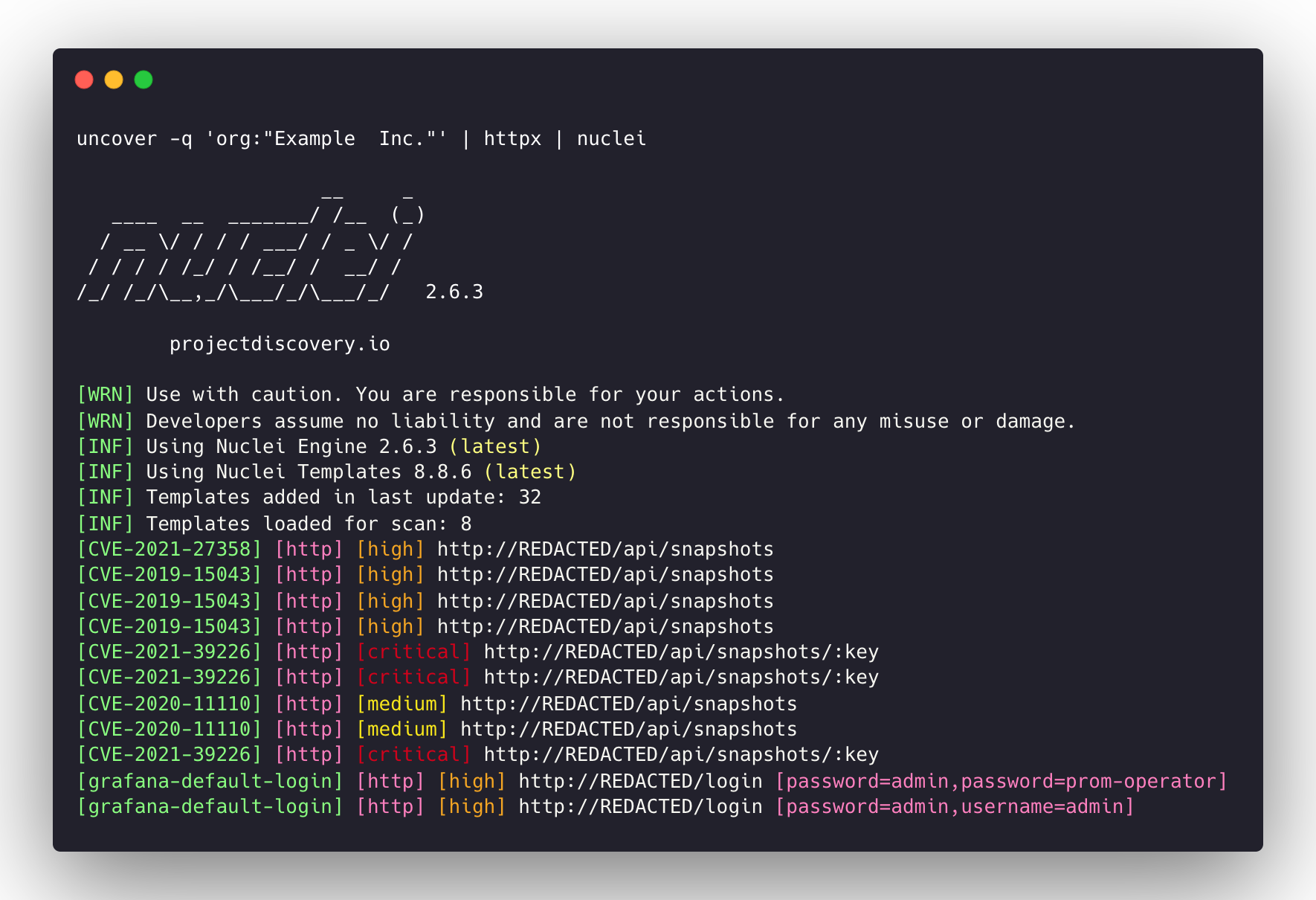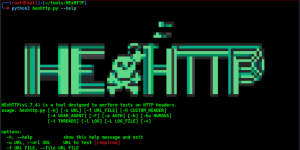Recon Tool: Uncover

Reading Time: 3 Minutes
Recon Tool: Uncover
Uncover
Uncover by Projectdiscovery lets you quickly discover exposed hosts on the internet using multiple search engine. It consists of a go wrapper using APIs of well known search engines to quickly discover exposed hosts on the internet. It is built with automation in mind, so you can query it and utilize the results with your current pipeline tools. Currently, it supports shodan, censys, and fofa search engine.
This can be a Bug Bounty Hunter’s sidekick, to quickly start gathering specific and targeted services and products essentially making you faster in discovering bugs that let’s you focus on the PoC and impact.
Features

- Simple and Handy utility to query multiple search engine
- Multiple Search engine support (Shodan, Censys, Fofa)
- Automatic key/credential randomization
- stdin / stdout support for input and output
See Also: Hundreds of GoDaddy-hosted sites backdoored in a single day
Installation Instructions
uncover requires go1.17 to install successfully. Run the following command to get the repo –
go install -v github.com/projectdiscovery/uncover/cmd/uncover@latest
Usage
uncover -h
This will display help for the tool. Here are all the flags it supports:
Usage:
./uncover [flags]
Flags:
INPUT:
-q, -query string[] search query or list (file or comma separated or stdin)
-e, -engine string[] search engine to query (shodan,fofa,censys) (default shodan)
CONFIG:
-pc, -provider string provider configuration file (default "$HOME/.config/uncover/provider-config.yaml")
-config string flag configuration file (default "$HOME/.config/uncover/config.yaml")
-timeout int timeout in seconds (default 10)
OUTPUT:
-o, -output string output file to write found results
-f, -field string field to display in output (ip,port,host) (default ip:port)
-j, -json write output in JSONL(ines) format
-l, -limit int limit the number of results to return (default 100)
-nc, -no-color disable colors in output
DEBUG:
-silent show only results in output
-version show version of the project
-v show verbose output
See Also: Complete Offensive Security and Ethical Hacking Course
Provider Configuration
The default provider configuration file should be located at $HOME/.config/uncover/provider-config.yaml and has the following contents as an example. In order to run this tool, the API keys / credentials needs to be added in this config file or set as environment variable.
shodan:
- SHODAN_API_KEY1
- SHODAN_API_KEY2
censys:
- CENSYS_API_ID:CENSYS_API_SECRET
fofa:
- FOFA_EMAIL:FOFA_KEY
When multiple keys/credentials are specified for same provider in the config file, random key will be used for each execution.
Alternatively you can also set the API key as environment variable in your bash profile.
export SHODAN_API_KEY=xxx
export CENSYS_API_ID=xxx
export CENSYS_API_SECRET=xxx
export FOFA_EMAIL=xxx
export FOFA_KEY=xxxRequired keys can be obtained by signing up on Shodan, Censys, Fofa.
See Also: Recon Tool: Metagoofil
Running Uncover
uncover supports multiple ways to make the query including stdin or q flag
echo 'ssl:"Uber Technologies, Inc."' | uncover __ ______ _________ _ _____ _____ / / / / __ \/ ___/ __ \ | / / _ \/ ___/ / /_/ / / / / /__/ /_/ / |/ / __/ / \__,_/_/ /_/\___/\____/|___/\___/_/ v0.0.1 projectdiscovery.io [WRN] Use with caution. You are responsible for your actions [WRN] Developers assume no liability and are not responsible for any misuse or damage. [WRN] By using uncover, you also agree to the terms of the APIs used. 107.180.12.116:993 107.180.26.155:443 104.244.99.31:443 161.28.20.79:443 104.21.8.108:443 198.71.233.203:443 104.17.237.13:443 162.255.165.171:443 12.237.119.61:443 192.169.250.211:443 104.16.251.50:443
Running uncover with file input containing multiple search queries per line.
cat dorks.txt ssl:"Uber Technologies, Inc." title:"Grafana"
uncover -q dorks.txt __ ______ _________ _ _____ _____ / / / / __ \/ ___/ __ \ | / / _ \/ ___/ / /_/ / / / / /__/ /_/ / |/ / __/ / \__,_/_/ /_/\___/\____/|___/\___/_/ v0.0.1 projectdiscovery.io [WRN] Use with caution. You are responsible for your actions [WRN] Developers assume no liability and are not responsible for any misuse or damage. [WRN] By using uncover, you also agree to the terms of the APIs used. 107.180.12.116:993 107.180.26.155:443 104.244.99.31:443 161.28.20.79:443 104.21.8.108:443 198.71.233.203:443 2607:7c80:54:3::74:3001 104.198.55.35:80 46.101.82.244:3000 34.147.126.112:80 138.197.147.213:8086
uncover supports field flag to specify fields to return, currently ip, port, host are supported.
uncover -q jira -f host -silent ec2-44-198-22-253.compute-1.amazonaws.com ec2-18-246-31-139.us-west-2.compute.amazonaws.com tasks.devrtb.com leased-line-91-149-128-229.telecom.by 74.242.203.213.static.inetbone.net ec2-52-211-7-108.eu-west-1.compute.amazonaws.com ec2-54-187-161-180.us-west-2.compute.amazonaws.com 185-2-52-226.static.nucleus.be ec2-34-241-80-255.eu-west-1.compute.amazonaws.com
uncover supports field flag which can be also used to customize the format of the output, for example in case of uncover -f https://ip:port/version, ip:port will be replaced with results in the output maintaining the defined format.
echo kubernetes | uncover -f https://ip:port/version -silent https://35.222.229.38:443/version https://52.11.181.228:443/version https://35.239.255.1:443/version https://34.71.48.11:443/version https://130.211.54.173:443/version https://54.184.250.232:443/version
uncover supports multiple search engine, as default shodan is used, engine flag can be used to specify any available search engines.
echo jira | uncover -e shodan,censys -silent 176.31.249.189:5001 13.211.116.80:443 43.130.1.221:631 192.195.70.29:443 52.27.22.181:443 117.48.120.226:8889 106.52.115.145:49153 13.69.135.128:443 193.35.99.158:443 18.202.109.218:8089 101.36.105.97:21379 42.194.226.30:2626
Output of uncover can be further piped to other projects in workflow accepting stdin as input.
- uncover -q example -f ip | naabu – Runs naabu for port scanning on the found host.
- uncover -q title:GitLab | httpx – Runs httpx for web server probing the found result.
uncover -q http.title:GitLab -silent | httpx -silent https://15.185.150.109 https://139.162.137.16 https://164.68.115.243 https://135.125.215.186 https://163.172.59.119 http://15.236.10.197 https://129.206.117.248
- uncover -q ‘org:”Example Inc.”‘ | httpx | nuclei – Runs httpx / nuclei for vulnerability assessment.

Notes:
- keys/ credentials are required to configure before running or using this project.
- query flag supports all the filters supported by underlying API in use.
- query flag input needs be compatible with search engine in use.
- results are limited to 100 as default and can be increased with limit flag.
See Also: Hacking stories: MafiaBoy, the hacker who took down the Internet









